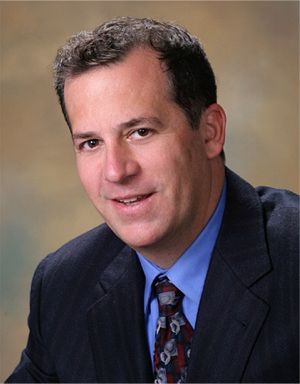| Most
in this industry think of Goldberger as one of the world’s best
domain attorneys. He is certainly that, but there's much more
to his story. When
I entered the business in the spring of 2002 there were plenty of
corporate IP attorneys at the big domain companies, but just a
handful of lawyers who represented the interests of domainers. |
|
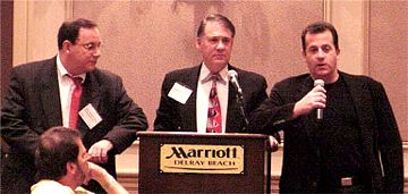
|
In
fact, at that time I kept seeing the same three names over and over
– Ari Goldberger, John Berryhill and Howard Neu. Though they ran
separate successful practices they were so omnipresent in the
business that they came to be known as the Three Amigos. For
that reason, like most, I only thought “attorney” when I heard
Ari’s name. |
| The
Three Amigos (left to right): John Berryhill, Howard
Neu and Ari Goldberger at the first T.R.A.F.F.I.C.
conference in Delray Beach, Florida in October
2004. |
|
That’s why it surprised me to learn in 2003 that
he had also started a PPC (pay per click) parking company affiliated with
Yahoo! (SmartName.com).
With all of the legal matters he was handling I
didn’t know where he could find the time to run a company at the
same time. Of course, that is the hallmark of a true entrepreneur.
Burning the candle at both ends is the norm.
I
was impressed that he could juggle all of his responsibilities and
still be successful with both enterprises. I was more impressed by
stories I started hearing privately about Goldberger – about
people in trouble that he had helped regardless of whether or not
they could pay. Goldberger has always felt compelled to stand up
for those no one else would stand up for. He can instantly
identify with people in dire straits, those for whom help is
nowhere in sight, because of the horror his own parents
experienced.
Adam
and Ruth Goldberger are both survivors of the
Holocaust. Only 5% of the 50,000 Jews who
lived in Cracow, Poland before the war managed to survive
extermination by the Nazis. Ari exists today only because his
parents were among that tiny fraction that made it through the
nightmare.
Before
the war, Ari's father Adam led a privileged life as the son of a
dentist. When the Nazis invaded and herded most of the Jews off to
concentration camps, Adam (then just 15 years old) was among 20
Jewish mechanics the Gestapo kept as prisoners who were forced to
work on German vehicles. Near the end of the war Adam was driving a
jeep that senior Gestapo officers were using to try to escape from
advancing Russian forces. When they stopped for the night, Adam managed
to drain the radiator while the Germans slept. He then convinced
them he had to walk into town to get water for the radiator and
used that opportunity to escape. Ari helped his father edit a book
about his experiences called Prisoner of the Gestapo: How I
Survived the Holocaust.
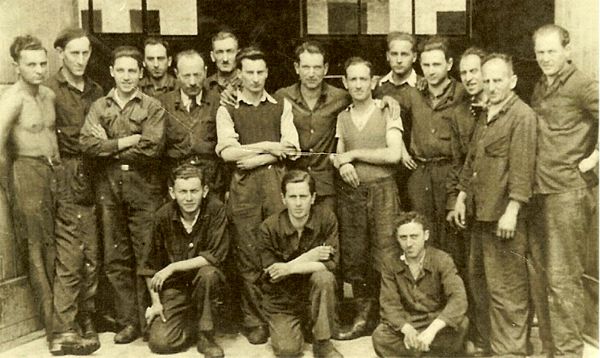
| The
Jewish mechanics. Adam Goldberger is standing, 3rd
from left with arms folded. Ari Goldberger said
"The mechanics were incredibly valuable to the
Germans because they were in captured territory and needed
working vehicles if they had to get away. My dad was
particularly valuable as he was fluent in Polish and
German." |
When
Ari’s mother Ruth was 12 years old her mother, Leonora, was taken away
by the Germans and later perished in the Maidonek concentration camp. Ruth
herself later went through several concentration camps, including
the Plaszow labor camp in Cracow (spelled Krakow in English) that
was featured in Steven Spielberg’s movie Schindler’s
List (the 1993 Academy Award Winner for Best Picture).
Ruth's father, well-known painter Leon Lefkowitz managed to escape to
Russia with Ruth’s sister Anna. Leon, whose paintings hang in
national museums in Cracow and Warsaw today, rolled up some of his
canvases and used them to bribe guards along his escape route to
Russia.
Speaking
of his grandfather, Ari said, “he painted Jews and Gypsies,
seeing a common thread in their homeless existence – never being
accepted into the societies where they lived. The faces in his
paintings foresaw what was coming. The irony is that when he
escaped to the Russian side, the victims he had painted aided him
when he became a victim himself.”
In
the camps, Ruth was able to draw nighttime
kitchen duty and eat the raw skins from the potatoes she had to
peel. She reunited with Adam in Cracow after the war and the
couple emigrated to Israel in 1946. Ruth did not learn until 1950
that her father had survived the war and was living in Russia, but
neither he nor Ruth’s sister Anna were allowed to leave the
country. She would never see her father again as he died just a
few years later. It would be another 26 years before Ruth was able
to travel to Moscow in 1976 and see Anna for the first time in
over three decades.
After
Anna died, one of her friends brought three of Leon’s paintings
to the U.S. in 1990 to give them to the Goldberger family.
Inspired by that artwork, Ari and his father traveled to Cracow six
years later and cataloged some 50 of Leon’s paintings that hung
at various locations in Poland. “I believe that I inherited a
lot of my creativity and care for the underdog from my grandfather
and parents,” Ari said.
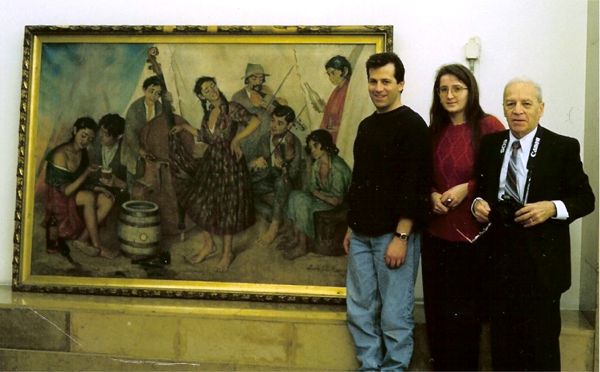
| 1996
photo of Ari Goldberger (left) with a museum guide
and Ari's father Adam at a gallery in Cracow,
Poland. They are standing next to a work done by Ari's
grandfather, noted Polish painter Leon Lefkovitz.
|
Ari’s
parents moved from Israel to the United States in 1958, following
friends and relatives who shared the dream of a better life in America. Ari was born 3 years later in
Vineland, New Jersey,
making him a first generation American. “My father worked as a
truck mechanic and later was a foreman for a trucking company. My mother worked as a lifeguard, ballet instructor, and ran an
exercise class she called “slimnastics” at the local YMCA.
“I
think my first taste of business was when I was around 3 or 4,”
Goldberger recalled. “We used to go to this beach frequented
by other Jewish immigrants. I would ask people for their
empty Coke bottles so I could get the 1 or 2 cent deposit and buy
a pretzel stick, Sugar Daddy, or wax bottle. When I was 5 or
6 a buddy of mine and I had fun doing these “stores” where we
would lay stuff out in our front yard. We didn’t care if
we sold anything. Just running the store was fun!”
“We
even ran a library – as we thought libraries could make money on
the late fees! Even though we didn’t make a dime, it was
still a blast. I think because I was kind of shy that running a
business was a vehicle for me to meet and interact with people.
I think it is that combination of the social connection of running
a business, along with the gratification from succeeding that has
motivated me from age 3 until today. It’s just fun!”
Goldberger declared.
“Growing
up, I knew at an early age that my parents were different. I knew
about the Germans and there was always this sense of the
preciousness of life and the importance of being kind to the
“little guy.” When I was 8 my mom told me about the
Jerry Lewis Telethon. I had always loved Jerry Lewis movies
but was so impressed that this guy dedicated his life to helping
handicapped children,” Goldberger said.
That
motivated him to begin a summer ritual of running carnivals,
getting the neighborhood kids to assist. “The first
carnival was to benefit the local hospital. We probably
raised about $20 but we were proud and it made the paper,”
Goldberger said. “The next year I got more sophisticated and got
the idea of calling local businesses out of the Yellow Pages for
donations of merchandise and services to sell. I really gained a lot of
business experience from this and loved organizing all the
neighborhood kids and parents who helped out.”
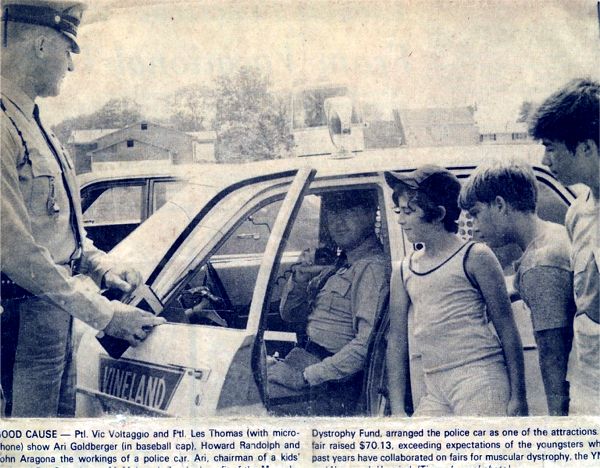
| Above
- newspaper clipping shows Ari Goldberger (in
baseball cap standing to the right of the seated
policeman) and friends he called on to help put on a
fundraiser for Muscular Dystrophy. Ari arranged for
the policemen and patrol car to be at their carnival as
one of the attractions. |
“When
I got a little older I got interested in stamp collecting, helped
found a stamp club and organized Stamp Exhibits to benefit
Multiple Sclerosis, as our adult advisor’s wife suffered from
this disorder. In high school, I was active in a number of
clubs and had fun organizing dances to raise money for events.
I was shy and probably would have never attended a dance if I hadn't organized
some first!” Goldberger said.
Continue to Page 2: Goldberger Blossoms
As Teenage Entrepreneur
|



